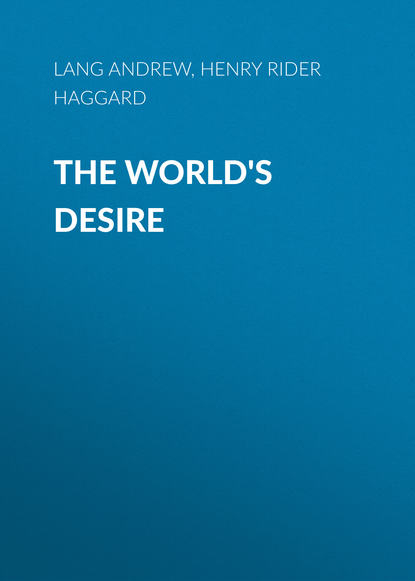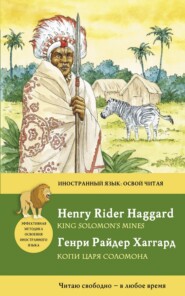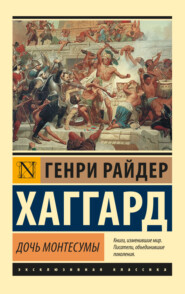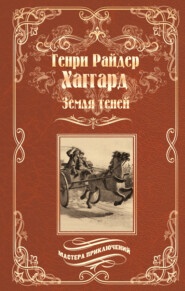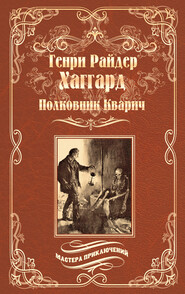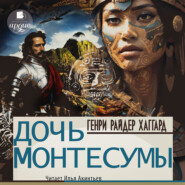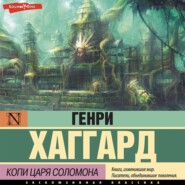По всем вопросам обращайтесь на: info@litportal.ru
(©) 2003-2024.
✖
The World's Desire
Настройки чтения
Размер шрифта
Высота строк
Поля
(Icmalios made me.)
At the sight of the armlet the Wanderer fell on the earth, grovelling among the ashes of the pyre, for he knew the gold ring which he had brought from Ephyre long ago, for a gift to his wife Penelope. This was the bracelet of the bride of his youth, and here, a mockery and a terror, were those kind arms in which he had lain. Then his strength was shaken with sobbing, and his hands clutched blindly before him, and he gathered dust and cast it upon his head till the dark locks were defiled with the ashes of his dearest, and he longed to die.
There he lay, biting his hands for sorrow, and for wrath against God and Fate. There he lay while the sun in the heavens smote him, and he knew it not; while the wind of the sunset stirred in his hair, and he stirred not. He could not even shed one tear, for this was the sorest of all the sorrows that he had known on the waves of the sea, or on land among the wars of men.
The sun fell and the ways were darkened. Slowly the eastern sky grew silver with the moon. A night-fowl’s voice was heard from afar, it drew nearer; then through the shadow of the pyre the black wings fluttered into the light, and the carrion bird fixed its talons and its beak on the Wanderer’s neck. Then he moved at length, tossed up an arm, and caught the bird of darkness by the neck, and broke it, and dashed it on the ground. His sick heart was mad with the little sudden pain, and he clutched for the knife in his girdle that he might slay himself, but he was unarmed. At last he rose, muttering, and stood in the moonlight, like a lion in some ruinous palace of forgotten kings. He was faint with hunger and weak with long lamenting, as he stepped within his own doors. There he paused on that high threshold of stone where once he had sat in the disguise of a beggar, that very threshold whence, on another day, he had shot the shafts of doom among the wooers of his wife and the wasters of his home. But now his wife was dead: all his voyaging was ended here, and all his wars were vain. In the white light the house of his kingship was no more than the ghost of a home, dreadful, unfamiliar, empty of warmth and love and light. The tables were fallen here and there throughout the long hall; mouldering bones, from the funeral feast, and shattered cups and dishes lay in one confusion; the ivory chairs were broken, and on the walls the moonbeams glistened now and again from points of steel and blades of bronze, though many swords were dark with rust.
But there, in its gleaming case, lay one thing friendly and familiar. There lay the Bow of Eurytus, the bow for which great Heracles had slain his own host in his halls; the dreadful bow that no mortal man but the Wanderer could bend. He was never used to carry this precious bow with him on shipboard, when he went to the wars, but treasured it at home, the memorial of a dear friend foully slain. So now, when the voices of dog, and slave, and child, and wife were mute, there yet came out of the stillness a word of welcome to the Wanderer. For this bow, which had thrilled in the grip of a god, and had scattered the shafts of the vengeance of Heracles, was wondrously made and magical. A spirit dwelt within it which knew of things to come, which boded the battle from afar, and therefore always before the slaying of men the bow sang strangely through the night. The voice of it was thin and shrill, a ringing and a singing of the string and of the bow. While the Wanderer stood and looked on his weapon, hark! the bow began to thrill! The sound was faint at first, a thin note, but as he listened the voice of it in that silence grew clear, strong, angry and triumphant. In his ears and to his heart it seemed that the wordless chant rang thus:
Keen and low
Doth the arrow sing
The Song of the Bow,
The sound of the string.
The shafts cry shrill:
Let us forth again,
Let us feed our fill
On the flesh of men.
Greedy and fleet
Do we fly from far,
Like the birds that meet
For the feast of war,
Till the air of fight
With our wings be stirred,
As it whirrs from the flight
Of the ravening bird.
Like the flakes that drift
On the snow-wind’s breath,
Many and swift,
And winged for death —
Greedy and fleet,
Do we speed from far,
Like the birds that meet
On the bridge of war.
Fleet as ghosts that wail,
When the dart strikes true,
Do the swift shafts hail,
Till they drink warm dew.
Keen and low
Do the grey shafts sing
The Song of the Bow,
The sound of the string.
This was the message of Death, and this was the first sound that had broken the stillness of his home.
At the welcome of this music which spoke to his heart – this music he had heard so many a time – the Wanderer knew that there was war at hand. He knew that the wings of his arrows should be swift to fly, and their beaks of bronze were whetted to drink the blood of men. He put out his hand and took the bow, and tried the string, and it answered shrill as the song of the swallow.
Then at length, when he heard the bowstring twang to his touch, the fountains of his sorrow were unsealed; tears came like soft rains on a frozen land, and the Wanderer wept.
When he had his fill of weeping, he rose, for hunger drove him – hunger that is of all things the most shameless, being stronger far than sorrow, or love, or any other desire. The Wanderer found his way through the narrow door behind the dais, and stumbling now and again over fallen fragments of the home which he himself had built, he went to the inner, secret storehouse. Even he could scarcely find the door, for saplings of trees had grown up about it; yet he found it at last. Within the holy well the water was yet babbling and shining in the moonlight over the silver sands; and here, too, there was store of mouldering grain, for the house had been abundantly rich when the great plague fell upon the people while he was far away. So he found food to satisfy his hunger, after a sort, and next he gathered together out of his treasure-chest the beautiful golden armour of unhappy Paris, son of Priam, the false love of fair Helen. These arms had been taken at the sack of Troy, and had lain long in the treasury of Menelaus in Sparta; but on a day he had given them to Odysseus, the dearest of all his guests. The Wanderer clad himself in this golden gear, and took the sword called “Euryalus’s Gift,” a bronze blade with a silver hilt, and a sheath of ivory, which a stranger had given him in a far-off land. Already the love of life had come back to him, now that he had eaten and drunk, and had heard the Song of the Bow, the Slayer of Men. He lived yet, and hope lived in him though his house was desolate, and his wedded wife was dead, and there was none to give him tidings of his one child, Telemachus. Even so life beat strong in his heart, and his hands would keep his head if any sea-robbers had come to the city of Ithaca and made their home there, like hawks in the forsaken nest of an eagle of the sea. So he clad himself in his armour, and chose out two spears from a stand of lances, and cleaned them, and girt about his shoulders a quiver full of shafts, and took in hand his great bow, the Bow of Eurytus, which no other man could bend.
Then he went forth from the ruined house into the moonlight, went forth for the last time; for never again did the high roof echo to the footstep of its lord. Long has the grass grown over it, and the sea-wind wailed!
II THE VISION OF THE WORLD’S DESIRE
The fragrant night was clear and still, the silence scarce broken by the lapping of the waves, as the Wanderer went down from his fallen home to the city on the sea, walking warily, and watching for any light from the houses of the people. But they were all as dark as his own, many of them roofless and ruined, for, after the plague, an earthquake had smitten the city. There were gaping chasms in the road, here and there, and through rifts in the walls of the houses the moon shone strangely, making ragged shadows. At last the Wanderer reached the Temple of Athene, the Goddess of War; but the roof had fallen in, the pillars were overset, and the scent of wild thyme growing in the broken pavement rose where he walked. Yet, as he stood by the door of the fane, where he had burned so many a sacrifice, at length he spied a light blazing from the windows of a great chapel by the sea. It was the Temple of Aphrodite, the Queen of Love, and from the open door a sweet savour of incense and a golden blaze rushed forth till they were lost in the silver of the moonshine and in the salt smell of the sea. Thither the Wanderer went slowly, for his limbs were swaying with weariness, and he was half in a dream. Yet he hid himself cunningly in the shadow of a long avenue of myrtles, for he guessed that sea-robbers were keeping revel in the forsaken shrine. But he heard no sound of singing and no tread of dancing feet within the fane of the Goddess of Love; the sacred plot of the goddess and her chapels were silent. He hearkened awhile, and watched, till at last he took courage, drew near the doors, and entered the holy place. But in the tall, bronze braziers there were no faggots burning, nor were there torches lighted in the hands of the golden men and maids, the images that stand within the fane of Aphrodite. Yet, if he did not dream, nor take moonlight for fire, the temple was bathed in showers of gold by a splendour of flame. None might see its centre nor its fountain; it sprang neither from the altar nor the statue of the goddess, but was everywhere imminent, a glory not of this world, a fire untended and unlit. And the painted walls with the stories of the loves of men and gods, and the carven pillars and the beams, and the roof of green, were bright with flaming fire!
At this the Wanderer was afraid, knowing that an immortal was at hand; for the comings and goings of the gods were attended, as he had seen, by this wonderful light of unearthly fire. So he bowed his head, and hid his face as he sat by the altar in the holiest of the holy shrine, and with his right hand he grasped the horns of the altar. As he sat there, perchance he woke, and perchance he slept. However it was, it seemed to him that soon there came a murmuring and a whispering of the myrtle leaves and laurels, and a sound in the tops of the pines, and then his face was fanned by a breath more cold than the wind that wakes the dawn. At the touch of this breath the Wanderer shuddered, and the hair on his flesh stood up, so cold was the strange wind.
There was silence; and he heard a voice, and he knew that it was the voice of no mortal, but of a goddess. For the speech of goddesses was not strange in his ears; he knew the clarion cry of Athene, the Queen of Wisdom and of War; and the winning words of Circe, the Daughter of the Sun, and the sweet song of Calypso’s voice as she wove with her golden shuttle at the loom. But now the words came sweeter than the moaning of doves, more soft than sleep. So came the golden voice, whether he woke or whether he dreamed.
“Odysseus, thou knowest me not, nor am I thy lady, nor hast thou ever been my servant! Where is she, the Queen of the Air, Athene, and why comest thou here as a suppliant at the knees of the daughter of Dione?”
He answered nothing, but he bowed his head in deeper sorrow.
The voice spake again:
“Behold, thy house is desolate; thy hearth is cold. The wild hare breeds on thy hearthstone, and the night-bird roosts beneath thy roof-tree. Thou hast neither child nor wife nor native land, and she hath forsaken thee – thy Lady Athene. Many a time didst thou sacrifice to her the thighs of kine and sheep, but didst thou ever give so much as a pair of dove to me? Hath she left thee, as the Dawn forsook Tithonus, because there are now threads of silver in the darkness of thy hair? Is the wise goddess fickle as a nymph of the woodland or the wells? Doth she love a man only for the bloom of his youth? Nay, I know not; but this I know, that on thee, Odysseus, old age will soon be hastening – old age that is pitiless, and ruinous, and weary, and weak – age that cometh on all men, and that is hateful to the Gods. Therefore, Odysseus, ere yet it be too late, I would bow even thee to my will, and hold thee for my thrall. For I am she who conquers all things living: Gods and beasts and men. And hast thou thought that thou only shalt escape Aphrodite? Thou that hast never loved as I would have men love; thou that hast never obeyed me for an hour, nor ever known the joy and the sorrow that are mine to give? For thou didst but ensure the caresses of Circe, the Daughter of the Sun, and thou wert aweary in the arms of Calypso, and the Sea King’s daughter came never to her longing. As for her who is dead, thy dear wife Penelope, thou didst love her with a loyal heart, but never with a heart of fire. Nay, she was but thy companion, thy housewife, and the mother of thy child. She was mingled with all the memories of the land thou lovest, and so thou gavest her a little love. But she is dead; and thy child too is no more; and thy very country is as the ashes of a forsaken hearth where once was a camp of men. What have all thy wars and wanderings won for thee, all thy labours, and all the adventures thou hast achieved? For what didst thou seek among the living and the dead? Thou soughtest that which all men seek – thou soughtest The World’s Desire. They find it not, nor hast thou found it, Odysseus; and thy friends are dead; thy land is dead; nothing lives but Hope. But the life that lies before thee is new, without a remnant of the old days, except for the bitterness of longing and remembrance. Out of this new life, and the unborn hours, wilt thou not give, what never before thou gavest, one hour to me, to be my servant?”
The voice, as it seemed, grew softer and came nearer, till the Wanderer heard it whisper in his very ear, and with the voice came a divine fragrance. The breath of her who spoke seemed to touch his neck; the immortal tresses of the Goddess were mingled with the dark curls of his hair.
The voice spake again:
“Nay, Odysseus, didst thou not once give me one little hour? Fear not, for thou shalt not see me at this time, but lift thy head and look on The World’s Desire!”
Then the Wanderer lifted his head, and he saw, as it were in a picture or in a mirror of bronze, the vision of a girl. She was more than mortal tall, and though still in the first flower of youth, and almost a child in years, she seemed fair as a goddess, and so beautiful that Aphrodite herself may perchance have envied this loveliness. She was slim and gracious as a young shoot of a palm tree, and her eyes were fearless and innocent as a child’s. On her head she bore a shining urn of bronze, as if she were bringing water from the wells, and behind her was the foliage of a plane tree. Then the Wanderer knew her, and saw her once again as he had seen her, when in his boyhood he had journeyed to the Court of her father, King Tyndareus. For, as he entered Sparta, and came down the hill Taygetus, and as his chariot wheels flashed through the ford of Eurotas, he had met her there on her way from the river. There, in his youth, his eyes had gazed on the loveliness of Helen, and his heart had been filled with the desire of the fairest of women, and like all the princes of Achaia he had sought her hand in marriage. But Helen was given to another man, to Menelaus, Atreus’s son, of an evil house, that the knees of many might be loosened in death, and that there might be a song in the ears of men in after time.
As he beheld the vision of young Helen, the Wanderer too grew young again. But as he gazed with the eyes and loved with the first love of a boy, she melted like a mist, and out of the mist came another vision. He saw himself, disguised as a beggar, beaten and bruised, yet seated in a long hall bright with gold, while a woman bathed his feet, and anointed his head with oil. And the face of the woman was the face of the maiden, and even more beautiful, but sad with grief and with an ancient shame. Then he remembered how once he had stolen into Troy town from the camp of the Achæans, and how he had crept in a beggar’s rags within the house of Priam to spy upon the Trojans, and how Helen, the fairest of women, had bathed him, and anointed him with oil, and suffered him to go in peace, all for the memory of the love that was between them of old. As he gazed, that picture faded and melted in the mist, and again he bowed his head, and kneeled by the golden altar of the Goddess, crying:
“Where beneath the sunlight dwells the golden Helen?” For now he had only one desire: to look on Helen again before he died.
Then the voice of the Goddess seemed to whisper in his ear:
“Did I not say truth, Odysseus? Wast not thou my servant for one hour, and did not Love save thee in the city of the Trojans on that night when even Wisdom was of no avail?”
He answered: “Yea, O Queen!”
“Behold then,” said the voice, “I would again have mercy and be kind to thee, for if I aid thee not thou hast no more life left among men. Home, and kindred, and native land thou hast none; and, but for me, thou must devour thine own heart and be lonely till thou diest. Therefore I breathe into thy heart a sweet forgetfulness of every sorrow, and I breathe love into thee for her who was thy first love in the beginning of thy days.
“For Helen is living yet upon the earth. And I will send thee on the quest of Helen, and thou shalt again take joy in war and wandering. Thou shalt find her in a strange land, among a strange people, in a strife of gods and men; and the wisest and bravest of man shall sleep at last in the arms of the fairest of women. But learn this, Odysseus; thou must set thy heart on no other woman, but only on Helen.
“And I give thee a sign to know her by in a land of magic, and among women that deal in sorceries.
“On the breast of Helen a jewel shines, a great star-stone, the gift I gave her on her wedding-night when she was bride to Menelaus. From that stone fall red drops like blood, and they drip on her vestment, and there vanish, and do not stain it.
“By the Star of Love shalt thou know her; by the star shalt thou swear to her; and if thou knowest not the portent of the Bleeding Star, or if thou breakest that oath, never in this life, Odysseus, shalt thou win the golden Helen! And thine own death shall come from the water – the swiftest death – that the saying of the dead prophet may be fulfilled. Yet first shalt thou lie in the arms of the golden Helen.”
The Wanderer answered:





